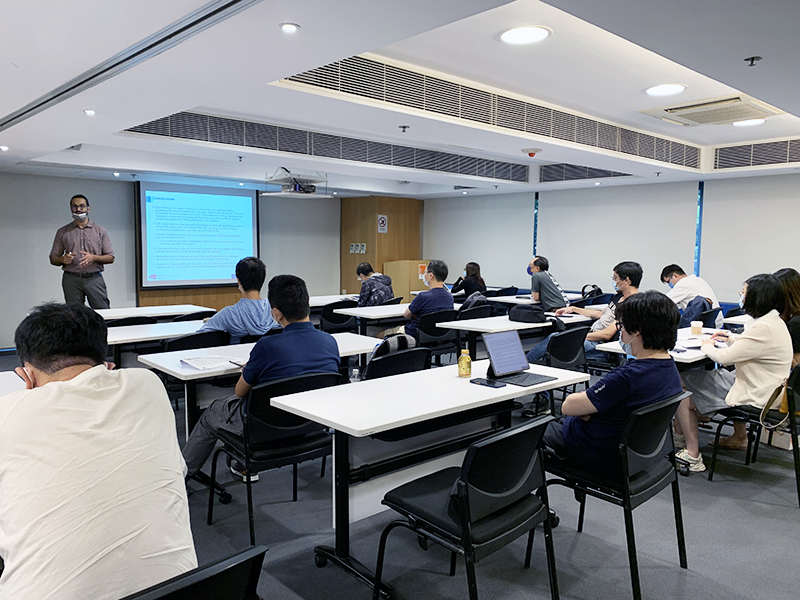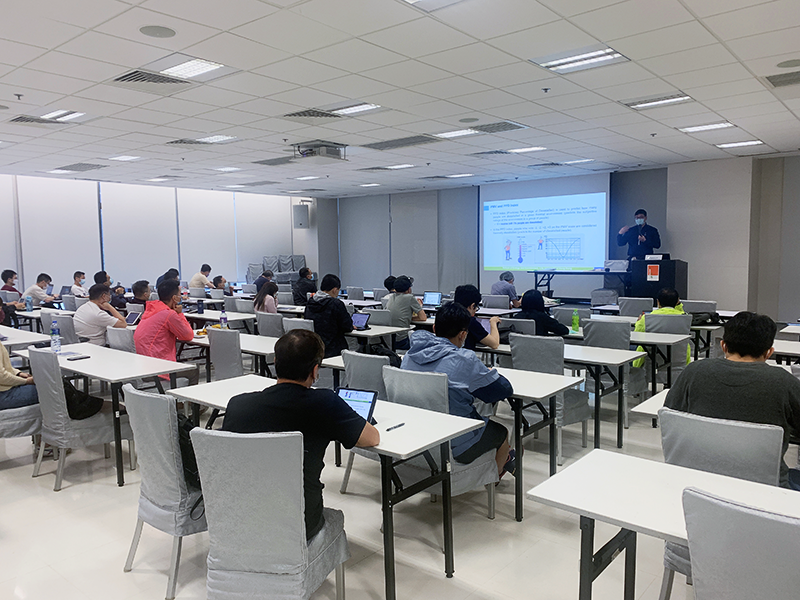

Chinachem Group’s Science-Based Targets Approved, Committing to Limit Global Warming to 1.5°C

APEC Workshop cum Training on Retro-commissioning (RCx) Held via Video Conferencing
Skills Upgrading Programme for Green Building Practitioners Concluded Successfully

Chinachem Group’s Science-Based Targets Approved, Committing to Limit Global Warming to 1.5°C

To tackle climate change and respond to the Hong Kong government's commitment to carbon neutrality, Chinachem Group has formulated a series of long-term decarbonisation strategies, covering its managed and operated premises and buildings. The Group has also committed to the goal of limiting global warming to 1.5°C. In January 2022, the Group's science-based targets (SBTs) were officially approved by the Science Based Targets initiative (SBTi). It has become Hong Kong’s second real estate developer to have completed SBTi validation.
The Group is committed to reducing Scope 1 and 2 operational GHG emissions by 51.8% by 2030 from a 2020 base year, while reducing Scope 3 GHG emissions from downstream leased assets, capital goods and waste generated in operations by 20% within the same timeframe.
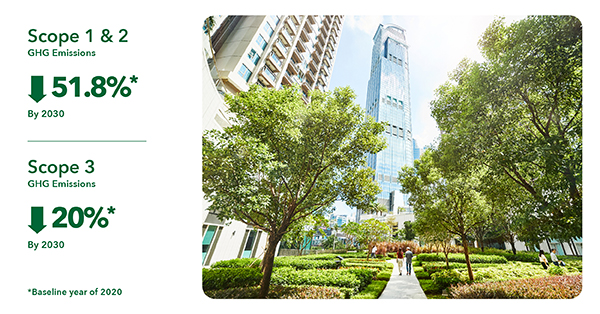
Moving forward, Chinachem Group will implement a further range of measures to reduce carbon emissions, including replacing air-conditioning systems and implementing retro-commissioning for its properties; adopting renewable energy in its operations; encouraging tenants to practise energy conservation; driving sustainable procurement; and strengthening waste management and recycling. The Group has formed an ESG Steering Committee led by the CEO to incorporate sustainability considerations into all business decision-making processes. A cross-department ESG Task Force has also been established to implement and monitor relevant policies and programmes.
Chinachem Group sets achieving sustainable development and creating shared value for people, prosperity and the planet as its long-term goal. Construction-related activities can have a significant impact on the environment. To help make Hong Kong a more liveable city, the Group has been ramping up its efforts to promote sustainability in the real estate sector. Recognition by SBTi has bolstered its confidence in achieving “Carbon Reduction Roadmap – CCG 3050+” to cut the Group’s carbon emissions by 51.8% in 2030, as compared with the base year of 2020.
Click here to learn more about sustainability initiatives of Chinachem Group.

APEC Workshop cum Training on Retro-commissioning (RCx) Held via Video Conferencing
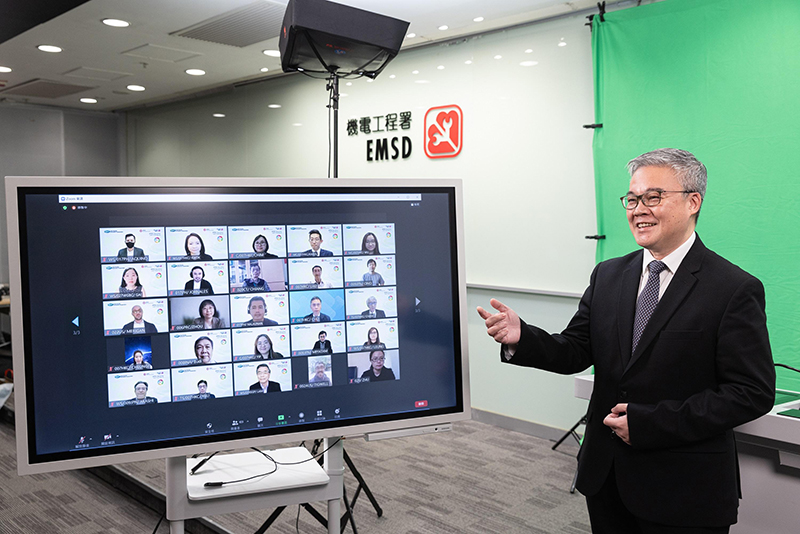
In recent years, HKGBC has been working closely with the Government of the HKSAR to enhance the RCx standards of industry professionals and service providers, as well as encourage the industry to adopt RCx as a primary energy conservation solution for existing buildings. In the Asia-Pacific Economic Cooperation (APEC) Workshop cum Training on Retro-commissioning (RCx), organised by the Electrical and Mechanical Services Department (EMSD) via video conferencing from 20 to 21 January 2022, HKGBC was invited to provide professional advice and coordination on the technical content of the workshop cum training sessions.
In his Opening Remarks, Mr WONG Kam-sing, Secretary for the Environment, explained that RCx is a cost-effective tool for reducing the overall electricity consumption of buildings, and affirmed that Hong Kong was honoured to host the online APEC workshop cum training to foster the wider adoption of RCx, which will ultimately help drive all member economies towards APEC's energy intensity reduction goal.
Mr Raymond POON, Deputy Director (Regulatory Services) of the EMSD, also emphasised that Hong Kong will continue to play an important role in the promotion of RCx, both in application and collaboration, as well as in the facilitation of energy efficiency enhancements using innovative and intelligent technologies.
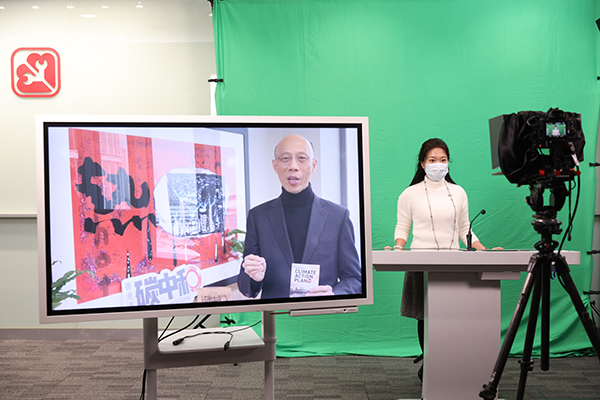
Mr WONG Kam-sing (left), delivering Opening Remarks
The event aimed to promote RCx across the APEC region by providing a platform for direct dialogue among member economies. Recognising the growing importance of RCx from the perspective of energy efficiency, the event drove progress toward meeting APEC’s energy intensity reduction goal, and increasing employment and economic activities post COVID-19. To fully achieve these goals, the event was spilt into two parts, including a half-day workshop that focused on policy, a roadmap for RCx implementation, incentives, and optimising RCx. There was also a one-day training that focused on the transformation and capacity building of the RCx industry, best practices, and innovative new RCx technologies.
Over 100 experts and delegates from 11 APEC member economies participated in the event, including representatives from WorldGBC, China, the United States, the Philippines, Singapore, Japan and Hong Kong, China, all of whom shared their knowledge and experience of RCx implementation during the workshop programme. Ms Grace KWOK, Director of HKGBC, moderated a plenary discussion with speakers. Likewise, Ir Dr Cary CHAN, JP, Executive Director of HKGBC, Dr Raymond YAU, Director of HKGBC, Dr Paul SAT, Head of Research and Public Education of HKGBC, and Dr Karen CHEUNG, Manager - Research and Practices of HKGBC, were all invited as speakers to deliver presentations at the one-day training.
Skills Upgrading Programme for Green Building Practitioners Concluded Successfully
The COVID-19 pandemic has had a prolonged influence on every aspect of our lives. Subsidised by the Matching Grant Scheme for Skills Upgrading, which was established by the Government in 2020, HKGBC introduced its Skills Upgrading Programme for Green Building Practitioners in early 2021. This programme recently came to a successful conclusion.
The Grant Scheme aims to provide training funds to industry associations for organising training programmes that upgrade the skills of individuals in various sectors, so that they will be better equipped with enhanced skills to overcome the current economic downturn and capitalise on the inevitable economic turnaround. The Council efficiently utilised the grant by equipping green building practitioners with multi-disciplinary knowledge about green and sustainable buildings.
In collaboration with the School of Energy and Environment of the City University of Hong Kong, the training programme was designed to provide CPD courses through a programme of 24 lectures taught by the faculty professors. A wide range of subject choices was offered, spanning key elements on the topics of green and sustainable building such as energy and carbon, indoor environment, outdoor environment, community aspects, materials and waste, building maintenance, and climate change, to name just a few. This multi-disciplinary tuition enabled practitioners to gain whole-system and whole-life thinking.
In recognition of the successful completion of the Skills Upgrading Programme for Green Building Practitioners, participants who attended at least 10 topics and passed the examination were awarded a Comprehensive Certificate. The Council highly appreciates all participants’ efforts in completing the 12-month training programme and sincerely hopes they will all excel in their future contributions to the industry.
